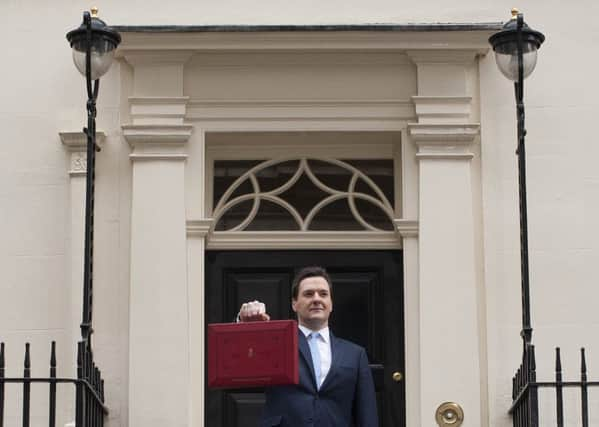Andrew Wilson: George Osborne’s dead cat economy


The phrase was coined to describe the temporary lift in a crashing stock before the descent to penny status and death which inevitably followed.
It can apply to economies too, and while no-one suggests the UK economy is dead or dying, predicting salvation on the back of a few quarters of tepid growth would be foolhardy. In his Budget speech last week, the Chancellor George Osborne hailed the return of the UK economy this year to where we were, in wealth created, when the crisis hit six years ago.
Advertisement
Hide AdAdvertisement
Hide AdHe pointed out that UK growth is so much stronger than the Office for Budget Responsibility forecast even four months ago that there will be £16 billion more swirling round the economy than they predicted at the end of last year. That is quite a big mis-call but at least it was on the upside.
This demonstrates once again that economic forecasting is not easy and that basing big judgements solely on OBR or any other forecast is, well, a mistake.
There is risk everywhere we look. As Osborne was honest enough to admit: “Our country still borrows too much. We still don’t invest enough, export enough or save enough.” Oh, and our budget deficit, “is still one of the highest in the world”. You may recall the reality of this following through into the Scottish numbers last week, and was argued by some – utterly bemusingly – as a reason to keep the policy and political culprits in position. But I digress.
So whether we have a dead, recovering or teetering cat remains to be seen. What we can see with crystal clarity, however, is that what we emphatically need from our finance minister and the whole Treasury team is a laser focus on policy, not politicking.
In all times, but especially in an epic era of risk and (we hope) recovery, we need our Chancellor and his aides to devote all of their minds, all of the time, to the resilience and recovery of the economy and what policies they can deploy to enhance it.
And this, I suggest, is Osborne’s Achilles’ Heel and therefore that of the current government. He is so clearly a partisan political Chancellor who is driven by tactical jousting with Ed Balls far more than he appears to be focused on the longer-term health of the economy.
Nowhere was this better demonstrated than the wizard wheeze to create a legislative cap on a wide range of welfare benefit payments of £119.5 billion in 2015/16, thereafter rising with inflation. That “rising with inflation” bit suggests that even if the economy drives greater structural need, then the completely arbitrary total will create an impasse.
Better, it seems, to have the sort of political grandstanding America’s Federal Shutdown created than to engage properly in transforming our system of welfare support for the neediest in society to make it fit for 21st century purpose.
Advertisement
Hide AdAdvertisement
Hide AdThe wheeze, you see, is to corner Labour over the Bedroom Tax which would lead to the cap being raised as, so goes the argument, it will cost £465 million.
As the economic think tank the IPPR commented: “As the coalition have divided opinions on social security cuts, with Liberal Democrats signalling their unwillingness to sign them off, the cap has no policy effect for now, but does set up a political battleground around spending at the election.”
Brilliant job, well done. The anxiety felt across society is at too low a level and could really do with more scapegoating of the poorest as a partisan political football.
However many person hours it took to dream that up in HM Treasury and Party HQ were clearly well spent.
So while japes were being played to set up yarns for future election tussles the underlying fragility of economic performance, social cohesion and personal stress levels remain.
This was a Budget with a near zero impact in net terms on the fiscal balance of government in the economy.
In the next five years, across all the measures it will see government taking an additional £150m from the economy. To place that in context, the total managed expenditure by government in the same period is £3,766bn. So this budget had a net impact of 0.004 per cent.
So while the headlines create the political noise being sought, bear in mind the reality of the economic impact is but a tear in the ocean.
Advertisement
Hide AdAdvertisement
Hide AdI confess to respecting Osborne as a politician. He clearly has a keen mind and is energetic and motivated. I have little time for the politics of grudge and personal abuse so, yes, I am weak, I see potential and good in him. But his entire focus seems utterly misdirected at present. And rather than the making of his party’s future victory it could be the undoing of his record when it matters most, now.
We live in times when the economic stakes have rarely been higher. We should have short patience for short-term politicking from the most important department of state. Now is the hour for big people of substance leading with vision and grace. There is still time for all to step up to that plate. «
Twitter: @AndrewWilsonAJW